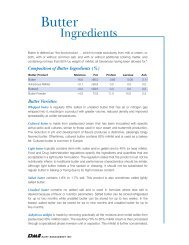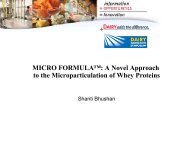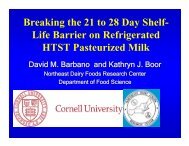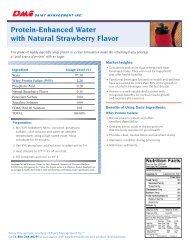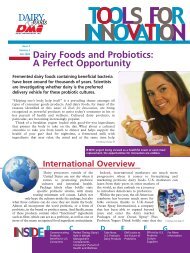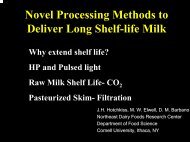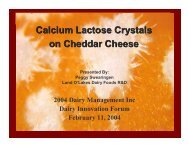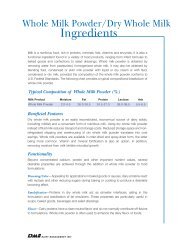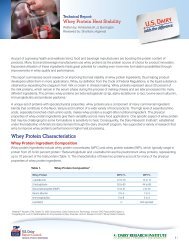APPLICATIONS MONOGRAPH ■ CALCIUMMAJOR FUNCTIONS OF CALCIUM IN THE BODYCALCIUM’S ROLEIN BONE DEVELOPMENTBones serve as a basic support systemprotecting vital organs <strong>and</strong> as a reservoir for<strong>calcium</strong> — the most abundant mineral inthe body. In fact, 99% of the body’s <strong>calcium</strong>is found in bones <strong>and</strong> teeth (the other 1% isfound in cells, blood, <strong>and</strong> other body fluids).Despite its static appearance, bone isconstantly being formed <strong>and</strong> broken down.This process, called remodeling, is theresorption (breaking down) of existing bone<strong>and</strong> deposition of new bone to replace thatwhich has been broken down. At any onetime, about 10% to 15% of bone surfacesare undergoing remodeling. A numberof interrelated hormonal, nutritional,mechanical, <strong>and</strong> genetic factorsinfluence remodeling.Resorption of old bone <strong>and</strong> formation ofnew bone are processes that continuouslyoverlap. The importance of these processesvaries at different times throughout the lifecycle. In general, from birth until aboutage 20, the bones are in a phase of activegrowth. Beginning in the 40s or later,resorption of existing bone starts to exceedformation of new bone, resulting in a netloss. Age-related bone loss is influenced byboth genetic <strong>and</strong> environmental factors.The body’s <strong>calcium</strong> status depends more onoverall nutritional factors than just <strong>calcium</strong>intake. Some nutritive factors influence thebody’s absorption of <strong>calcium</strong>, while otherfactors affect <strong>calcium</strong> retention or urinary<strong>calcium</strong> excretion. Urinary losses of <strong>calcium</strong>are a big determinant of <strong>calcium</strong> loss.Calcium nutriture depends not only on<strong>calcium</strong> intake, but also on numerousdietary <strong>and</strong> nondietary factors that influence<strong>calcium</strong> metabolism. Dietary factors aiding<strong>calcium</strong> absorption <strong>and</strong> retention include:vitamin D, lactose (which stimulatesthe intestinal absorption of <strong>calcium</strong> inlaboratory animals <strong>and</strong> in human infants),fructo-oligosaccharides, phosphorus,protein, sodium <strong>and</strong> other elements.BEYOND BONESCalcium also is important for thedevelopment of teeth. Teeth, like bones,are calcified tissue. The teeth begin to formin the first few months of fetal life <strong>and</strong> themineralization process continues into lateadolescence. An adequate intake of <strong>calcium</strong>,in addition to phosphorus, protein, fluoride,<strong>and</strong> vitamins A, C, <strong>and</strong> D, is needed forproper development of tooth structures.Although the mature tooth is metabolicallyactive, the fully eruptive adult tooth is notsignificantly subject to resorption.Outside of bones <strong>and</strong> teeth, the level ofionized <strong>calcium</strong> in the blood must bemaintained within a narrow range toperform <strong>calcium</strong>’s regulatory functions.When the diet is low in <strong>calcium</strong>, thebones release enough <strong>calcium</strong> into thebloodstream to meet the body’s needs.Although the amount of <strong>calcium</strong> outsidebones <strong>and</strong> teeth is relatively small, it isrequired for a number of basic regulatoryfunctions including:• Contraction <strong>and</strong> relaxation of muscle(including normal heart beat)• Coagulation of blood• Transmission of nerve impulses• Activation of enzyme reactions• Stimulation of hormone secretions• Integrity of intracellularcement substancesCalcium for Mature Adults51 <strong>and</strong> OlderEverybody needs <strong>calcium</strong>. But withage, one needs more to offset <strong>calcium</strong>losses from bone <strong>and</strong> decreased<strong>calcium</strong> absorption. Individuals 51or over need 1,200mg of <strong>calcium</strong>a day. Though <strong>calcium</strong> can be foundin a variety of foods, leading healthexperts recommend <strong>milk</strong> <strong>and</strong> <strong>milk</strong><strong>products</strong> as the preferred sourcesof <strong>calcium</strong>.2eJ.2
APPLICATIONS MONOGRAPH ■ CALCIUMFOUR GOOD REASONSTO COUNT ON CALCIUMWhile there are no magic bullets or miraclecures, researchers are finding that somenutrients such as <strong>calcium</strong> can play a majorrole in disease prevention. Appropriate <strong>dairy</strong>consumption <strong>and</strong> <strong>calcium</strong> intake may helpreduce the risk of:• Osteoporosis• High Blood Pressure• Colon Cancer• Cardiovascular DiseaseCALCIUM AND CHRONICDISEASE PREVENTIONIncreasing scientific evidence indicates thatan adequate <strong>calcium</strong> intake may help reducethe risk of several major chronic diseasesincluding osteoporosis, hypertension, coloncancer, <strong>and</strong> possibly cardiovascular disease<strong>and</strong> kidney stones. These diseases areresponsible for considerable morbidity<strong>and</strong> mortality in many patients, as well asrising national health expenditures.OSTEOPOROSISOne out of two women <strong>and</strong> one out of eightmen will develop osteoporosis. A diet highin <strong>calcium</strong> can help slow bone loss.Osteoporosis (porous bones) is a skeletaldisease in which bones become so fragilethey spontaneously break as a resultof a minor fall or even from everydayactivities. Decreased bone mass <strong>and</strong>microarchitectural damage to bone tissuecause the bones to become fragile.The rate of osteoporosis has reachedepidemic proportions in many countriesof the world <strong>and</strong> is responsible forconsiderable morbidity, mortality,<strong>and</strong> economic costs.Diet, specifically <strong>calcium</strong> intakes below therecommended levels throughout life, mayincrease the risk of osteoporosis. Also, aninadequate vitamin D status contributesto low bone mass. Ensuring an adequate<strong>calcium</strong> <strong>and</strong> vitamin D status throughout lifeis estimated to reduce osteoporotic fracturerisk by 50% or more. Other dietary factorslike sodium, protein, <strong>and</strong> fiber may influencethe risk of osteoporosis by impacting<strong>calcium</strong> status. However, if <strong>calcium</strong> intakeis adequate, these other dietary factors haverelatively little effect on osteoporosis risk.Osteoporosis experts agree that an optimalintake of <strong>calcium</strong> throughout life, from earlychildhood <strong>and</strong> adolescence through thepostmenopausal <strong>and</strong> later adult years,reduces the risk of osteoporosis. Researchindicates that it is never too early or too lateto improve bone health <strong>and</strong> reduce the riskof osteoporosis. Intake of <strong>milk</strong> <strong>and</strong> <strong>milk</strong><strong>products</strong> has been demonstrated to protectagainst osteoporosis by increasing boneretention <strong>and</strong> reducing fractures.In a study involving over 5,500 women50 years of age <strong>and</strong> older from six countries,an adequate <strong>calcium</strong> intake from <strong>milk</strong>decreased the number of hip fracturesby 35%.eJ.33



